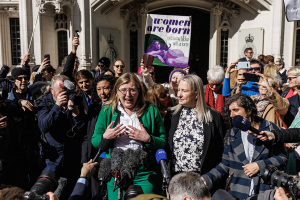Atheists Order Florida City to Remove 131-Year-Old City Seal Due to Cross Symbol; Legal Group Says Court Decision Would Be 'Subjective'
A city in Florida is battling an atheist group regarding its official city seal that depicts a cross, heart, and anchor. While the atheist group argues the symbols are biblically religious, the city argues they are a part of the town's history and carry no sectarian meaning.
The Becket Fund for Religious Liberty, a non-partisan, non-religious group dedicated to defending the freedom of all religions, has argued that cases such as these are very "fact intensive and subjective," and the ruling often depends on the "predilections" of the judge because there is no Supreme Court ruling that sets the standard for all cities.
In late August, the local Florida chapter of Americans United for Separation of Church and State, a national church-and-state watchdog group, sent a letter to the city of DeLand, Fla. arguing that its city seal violated the constitution's First Amendment Establishment Clause because it depicted religious imagery on its municipal seal. The letter argues, in part, that the heart, anchor and cross on the seal "are widely understood to symbolize the Christian 'theological virtues' discussed by Paul the Apostle in 1 Corinthians 13:13." The group demanded the city take action and amend its historic seal within 30 days or it would take legal action.
The city's Attorney Darren Elkind sent a return letter to Americans United in early September arguing that the city's seal is not meant to suggest any religious theme, but rather it was created more than 130 years ago in 1882 as a testament to the city's founder, Henry DeLand, to represent the virtues of "faith, hope and charity."
"Nothing in the history of the city's seal suggests that it was adopted to promote any particular religion or even religion in general," Elkind wrote.
Additionally, Elkind told The Christian Post in a previous interview that the seal reflects DeLand's vision to "establish this city as a place of education and culture, and where he, as well as others, would charitably help others to help themselves."
"The city was named after Henry DeLand and the symbol of 'faith, hope and charity' was adopted because those words symbolized the vision of Henry DeLand's for this community," Elkind said, adding that "it was simply fortuitous that the symbol happened to be a Christian one." Elkind added that the city plans to defend the seal.
Luke Goodrich, an attorney for the Becket Fund for Religious Liberty, told The Christian Post that lawsuits relating to city seals and religion are often "fact intensive" and depend upon the "predilections of the judge" in the case.
"In general, the law in this area is very fact intensive and subjective. That's part of the problem. The Supreme Court has never adopted a very clear standard for resolving cases like this one. You get complaints like this all around the country and it's very difficult to predict how the court will come out and it ends up depending on the subjective predilections of the judge on the case," Goodrich told CP.
Goodrich went on to say that there are some common facts that judges look at that could result in a ruling in the city's favor, such as the age of the seal and the prominence of the alleged religious symbol.
"There are common facts that the judges tend to look at. How old is the seal, how old is the symbol at issue? The fact that this one has been around for 131 years without complaint is going to strengthen the city's case," Goodrich said, adding that courts also look "at how prominent and exclusive the religious symbolism is."
There have been several cases relating to city seals in the past. In 2004, Los Angeles County supervisors voted to remove the tiny gold cross from their county seal to avoid a threatened lawsuit by the American Civil Liberties Union. In Bernalillo County, New Mexico in 1985, a court struck down the county's fight to keep its seal that included a radiating cross and the Spanish motto, "With This We Will Overcome."
On the other hand, an atheist lawsuit against the city of Las Cruces, New Mexico over its city seal that depicted three white crosses, the middle one slightly taller than the other two, lost in court when the tenth circuit ruled the seal represented the city's name and history and was therefore allowed to remain.
Austin, Texas was also allowed to keep its seal, derived from the coat of arms of the city's founder Stephen Austin that showed a Latin cross with a pair of wings. A court ruled that the seal reflected the city's history because it was related to the town's founder.
Liberty Counsel, a Christian legal group also dedicated to defending religious freedom, has vowed to defend the city of DeLand pro-bono, should Americans United decide to file a lawsuit against the city regarding its seal. Mathew D. Staver, founder and chairman of the Liberty Counsel, said in a press release regarding DeLand that removing the cross from the city seal would show a hostility towards religion.
"Despite secularist attempts to eradicate religion from our history and public square, religion is indelibly woven into the American experience," Staver said in the statement.
"To remove the heart, anchor, and cross from the DeLand city crest would be like forbidding the recognition of Valentine's Day because love is a concept found in the Bible. Liberty Counsel stands behind the city of DeLand and its 131-year-old seal. To remove the cross from the historic seal would be absurd and demonstrate hostility toward religion," Staver added.





























